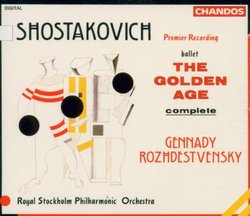Not a dull moment - A neglected masterpiece
Russ | Richmond, VA | 07/12/2006
(5 out of 5 stars)
"The music of the Soviet composer Dmitri Shostakovich (1906-1975) is often divided into an early period and a later period, with the first composition of the later period being his popular fifth symphony. The event affecting the change in style between the two periods was an article appearing in Pravda in 1936, which criticized "Lady Macbeth of Mtsensk," an opera composed by Shostakovich. Apparently, this was an article that appeared at the directive of Stalin, who had walked out on the performance of the opera in disgust. With the publication of this article, the free-spirited, demented, wacky inventiveness (if you can imagine such a combination) of Shostakovich's music came to an end, with the composer adopting a more personal approach. The masterpieces of Shostakovich's early period include the above mentioned opera, the epic Symphony No. 4 and the first of Shostakovich's three ballets, "The Golden Age."
The story of "The Golden Age" concerns a group of Soviet soccer players, who travel to a decadent country in Western Europe. In the words of Shostakovich: "Throwing into contrast the two cultures was my main aim in the ballet. I approached the task in the following way: the west European dances breathe the spirit of the depraved eroticism which is characteristic of contemporary bourgeois culture, but I tried to imbue the Soviet dances with the wholesome elements of sport and physical culture." The problem with this statement is that it sounds like Shostakovich is having just a little too much fun imitating the music of the "bourgeois culture" which he wasn't supposed to like, while the "wholesome" music of the Soviet soccer players seems just a bit corny. But, this is what makes the music of Shostakovich interesting, and a real hoot to listen to.
If you are a Shostakovich fan, you are probably familiar with the four movement suite from the ballet, and if you were entertained by that selection, you should certainly get this complete version. The music from this two hour (plus) ballet is far more varied than the suite would suggest. Also, the suite contains none of the work's outrageous finales. The finale from Act One (CD 1 - No. 19), for instance, starts off as a pleasant fox-trot (those familiar with the first piano concerto may recognize this theme), but the music quickly fugues itself into a frantic frenzy of blaring brass, psychotic xylophone playing and a series of gong crashes for good measure. Come to think of it, "The Age of Gold" contains more gong crashes than other piece of which I am aware.
The ballet is filled with several other distinctive movements. The "Sports Contest" movement (CD 2 - No. 3) sounds like a demented "Ukrainian Bell Carol." Another favorite is rhythmically deranged "Tap Dance." The orchestration of this music is always colorful, and includes some rarities, including a saxophone, a flexatone, a banjo, and in one movement, a crank. Further, it should be mentioned that this ballet isn't delicately scored. The texture is dense with percussion and brass with very busy writing for the strings and woodwinds.
I think the enthusastic playing by the Royal Stockholm Philharmonic Orchestra is great. The recorded sound is quite good as well.
Make no mistake; this ballet is not part of the tradition of Tchaikovsky. However, if you appreciate the sarcastic wit of Shostakovich, the complete recording of this ballet is indispensable. For those unfamiliar with the early works of Shostakovich, and are curious, this CD is an excellent introduction. Highly recommended.
CD 1: 68:07
CD 2: 65:39"
Good performance of a quite forgotten work.
Francisco Yanez Calvino | Santiago de Compostela, GALIZA, Spain. | 02/06/2006
(4 out of 5 stars)
"Shostakovich's The Golden Age was his first complete ballet to be fully represented on the stage, something that gave Dimitri lot of troubles because of the complexity of this music in the early years of the Soviet Union, in which the audience was not very open to new sounds and in which the official composer's Trade Union was pointing as `formalist' every music different of the socialist canon based on easy forms composed to praise the benefits of the socialist revolution. In the premiere some of the players and most of the dancers thought this music was unplayable and impossible to dance, something that of course has changed very, very much in the last years.
Based on a sports competition between western and communist athletes, the composition is highly propagandistic, representing the capitalist decadence by jazz and Foxtrot motives and the communist value by the strong and athletic dances of the soviets. Anyway, the music is quite good, typical from DSCH early period, like his three first symphonies, The Nose, Piano Sonata number one or this own ballet.
The performance is good as it's very good the recording too. Rozhdestvensky knows Shostakovich's music fairly well as he has shown in many recordings, but I give it four stars as I think it could be a little better probably if it's recorded with one of the major orchestras.
Anyway, there is no other complete recording of the full ballet like this, the world premiere. I know some other versions of the suites, quite good, like Haitink's one, but for the complete ballet you should buy this one with no doubt.
"


 Track Listings (22) - Disc #1
Track Listings (22) - Disc #1